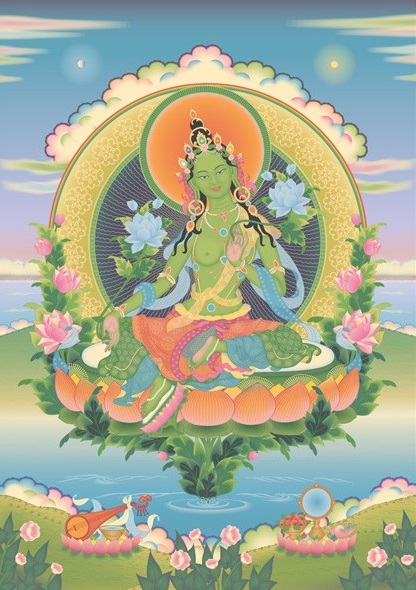
ཨོཾ་ཏཱ་རེ་ཏུཏྟཱ་རེ་ཏུ་རེ་སྭཱ་ཧཱ།
OM TARE TU TARE TURE SWAHA
As stated in the benefits of the 21 Praises of Tara:
Mindful fearlessness will be completely bestowed, negativity will be totally pacified, and all of the lower realms will be destroyed. The empowerment of seventy million Victorious Ones will quickly be conferred, and more than this, your activity will increase, and ultimately realize the level of Buddhahood. If there was a great, powerful poison, either animate or inanimate, that was either eaten or drunk, through simply recalling (the goddess), it would be completely eliminated. The torment of spirits, diseases and poisons, these host of sufferings, will be completely eliminated, for other sentient beings also. If a child is wanted, a child will be obtained, if wealth is wanted, riches will be gained, all of one’s wishes will be granted, and obstacles will be eliminated, individually defeated.
ATISHA AND TARA
It is interesting to note that Atisha’s life was marked by a profound bond to Tara. This bond seems related to his coming to Tibet. His relationship to the deity will illustrate for us how Tara manifests her activity.
Miraculous Transformation
As soon as Atisha was born, the goddess clearly dictated that she would protect the child. Atisha was born in 982 CE, the second son of a royal family from Bengal. His parents named him Chandragarbha, Moon Essence. While the newborn was sleeping in his cradle on the upper floor of the palace, the king and queen
heard mysterious music coming from outside. The queen saw a lotus fall from the sky and land in front of the cradle. At the same time, the child’s face was transformed into Tara’s face. Everyone concluded from this that Tara had been his tutelary deity for many lifetimes.
Choosing Ethics
When Atisha became a teenager, his father, the king, organized many great parties in which many princesses and their entourages participated. All of them, charmed by the beauty and attitude of the prince, looked upon him with desire. A pale blue goddess who was none other than Tara appeared and admonished Chandragarbha.
“If, like an elephant sinks deeply in mud, you, a hero, sink into the quagmire of desire, would not this stain the robes of ethics you have worn for 552 previous lifetimes in which you were always a scholar without defect, a perfect monk? Like the swans looking for lakes adorned with lotuses, you must seek ordination in this life!”
Having become a monk at the age of 29, Atisha ardently devoted himself to study and practice. In time, his fame spread and he was invited several times to Tibet where the persecutions against buddhism by King Langdarma had created a critical situation. However, Atisha was reluctant to abandon his monastic responsibilities as Vikramashila’s Abbot and to go to this reputedly difficult Northern country. Several interventions by Tara were necessary to convince him.
How to Make Amends for a Fault
One day, Atisha approved the expulsion of the monk Maitrepa from Vikramashila University. Maitrepa’s behavior was slightly out of the norm but his yogic realization was immense. A little later, Atisha had a dream in which Tara appeared and told him: “The monk you have expelled is a bodhisattva. It is not permitted to act against a bodhisattva even involuntarily. Anyone not knowing how to rectify a mistake like this will be reborn with a body as large as Mount Meru upon which thousands of birds and insects will feed.” “How can I avoid that disastrous consequence?” asked the frightened Atisha. “You must go to the Northern country and devote yourself to propagating Mahayana teachings there,” answered Tara.
The Yogini’ s Message
Tara appeared again to Atisha in a dream and requested that he visit a certain temple where he would meet a yogini who had something important to tell him. The next morning, he went to the temple and met the yogini. Having offered her some flowers, he told her. “I was invited to go to Tibet. Will my mission be successful?” “Your journey to Tibet will be very fruitful,” answered the yogini. “Besides, you will meet a lay person (Drom Tonpa) there who will be a tremendous help to you.”
Tara’s Warning
When the Tibetan King Jangchub sent emissaries to invite him to his country, Atisha again consulted Tara on the opportunity to accept. The deity told him. “If you go to Tibet, it will be extremely useful. However, your life will be shortened.”
“How many years?”
“If you do not go to Tibet, you will live to be 92 years old. If you go, you will die at the age of 73.”
“Twenty years of my life are not really important,” thought Atisha. “If I sacrifice them, I can work to benefit beings and spread the doctrine.” Thus, at the age of 59, Atisha left the warm plains of India to reach the high plateaus of Tibet buffeted by icy winds. He devoted the rest of his life to teaching in Tibet and died there. By this story we see not only how Tara was an inspiration for Atisha but also we see her ardor in leading her beloved child to the Land of Snow. From the eternal omniscience of the buddhas to their transmission in the Land of Snow, passing through the celestial worlds and the great realized yogis of India, such was the path followed by the revelation of the Tara Tantra.

